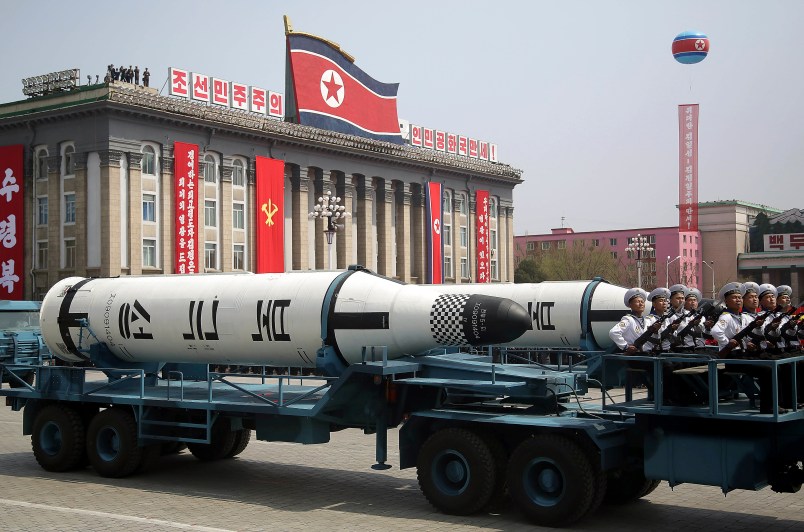Word out of South Korea and Northeast Asia generally is that people in the region are seeing all the Trump winning and are getting sick of all the winning. The AP reports that Trump is finding Asian allies cool to a preemptive strike and The Washington Post Tokyo bureau chief last night suggested on Twitter that people in the region are more worried about rash action from President Trump than North Korean leader Kim Jong-un, which is really quite an achievement if you think about it.
I doubt many people reading this post have much faith in Donald Trump’s judgment, military or otherwise. But I want to zero in on a specific point in this current stand-off. We’ve heard repeated references to the US contemplating a “preemptive strike” against North Korea and portentous warnings that the “era of strategic patience is over.” Vice President Pence, in South Korea over the weekend, warned that “North Korea would do well not to test his resolve or the strength of the armed forces of the United States in this region.”
But again, let’s consider the issue of a “preemptive strike.” The logic of a preemptive strike, particularly in a case like this where the possible casus belli is a kind of weaponry (ICBMs/nuclear weapons), is that you strike first and disable or significantly degrade the weapons or threat you want to eliminate. But it’s not clear that anything like that is possible at anything remotely like the cost we want to contemplate.
The central issue with North Korea is their nuclear weapons programs. Those weapons and the laboratories and infrastructure to build them are, unsurprisingly, heavily fortified and deep underground. Then there’s missiles and ICBMs. Missiles prepped for launch could likely be destroyed on the ground without much difficulty. But missiles under construction or the ability to make more in the future would be a different matter entirely.
It’s true that with time and the full force of the entire American military, the US could likely destroy most or all of the North Korean military and even the North Korean government itself. But only at the cost of many thousands of American lives and probably hundreds of thousands of civilians in the region. Short of that, it’s not clear what a “premptive strike” would really accomplish other than start a war at the moment of the US’s choosing.
As you’ve likely heard many times in recent days, Seoul, one of the world’s largest cities (#16 worldwide) is just 35 miles from the highly militarized border between North and South (the DMZ). The North’s ability to inflict retaliatory damage is immense. And back to the point of a “preemptive strike”, it’s not clear that the US could do anything by striking first to significantly reduce this ability to inflict vast damage in South Korea and perhaps in Japan as well.
It resolves to a simple point: the logic of a “preemptive strike” is that you can solve or mostly solve the problem at issue by striking hard and first. But that doesn’t seem to be the case here. So a “preemptive strike” really just means starting a war, which we couldn’t necessarily control in scope or duration once we started it.
So what are we supposed to do? What are our options? The idea that a state with the history of wild actions (assassinating multiple members of the government in the South, etc.) would have the capacity to launch nuclear weapons against the continental US is an obvious threat to US security. The simple and uncomfortable truth each of the last three administrations confronted is that the US does not have many or really any good options here. The real strategy, to the extent there is one, seems to be that a credible threat of attack will overawe the North Koreans. Failing that, perhaps a potent attack, while not eliminating or significantly degrading the North’s military capacity, would nonetheless force a rethinking of the North’s policy of belligerence and weapons building. Maybe. But maybe not. And as the Army folks are fond of saying: Hope is not a plan.
One particular point of concern is this repeated claim that “the era of strategic patience is over.” That sounds cool. But it also sounds a lot like a threat or even a promise of military action – one you need to be very careful about making unless you really plan on following through.
Pence’s boast about North Korea seeing the “resolve” President Trump showed in Syria and Afghanistan frankly rings a bit hollow. A simple truth. Those countries can’t fight back. Setting aside asymmetric threats expressed through state-backed or transnational terrorism, the US can bomb those countries with impunity. Attacking a country that has a lot of ability to fight back is an entirely different matter. I think everyone in the region and anyone thinking has to get that. Does Trump? I’m not sure.






